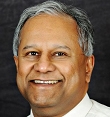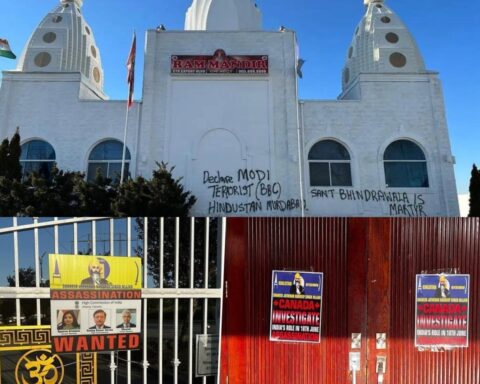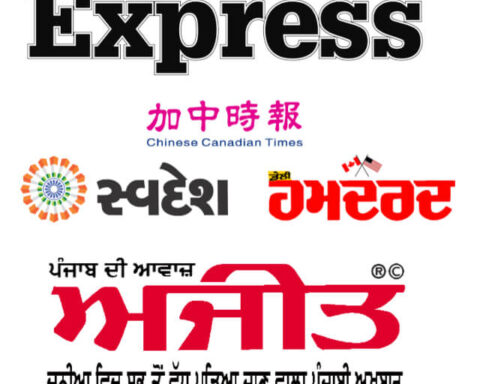The Canadian urge to do better than folks south of the border seems to have rubbed off on the country’s more recent immigrants. Indo-Canadians set out to outdo the reception Indian Prime Minister Narendra Modi got at New York’s Madison Square Gardens during his visit to the United States and looks like they came very close to it at the smaller Ricoh Coliseum venue in Toronto this Wednesday.
The lavish cultural show put up at the event set the tone for the evening with its unabashed patriotic celebration of India and its diversity. It was India condensed for the initiated and Bollywood live for the rest. The organizers wanted to put up a befitting welcome for their “rock-star” and they did a fairly good job working up the crowd, which had a large group of partisan supporters of India’s Bharatiya Janata Party, of which Modi is a leader.
Looking to channel that support for his own party was Prime Minister Stephen Harper, who flew in with his wife Laureen in Modi’s Air India plane from Ottawa.
“We extended to Modi a hand of friendship long before others did.” – Stephen Harper
In the nation’s capital the two leaders had finalized a slew of initiatives, including a deal to supply over seven million pounds of uranium concentrate to India over the next five years for nuclear power generation.
“Canada and India have a longstanding and mutual interest in expanding our trade relationship, particularly in the area of energy cooperation,” said Harper in an official press statement. “This contract is a clear signal that our countries are open for expanding business partnerships together.”
What was also signalled at the Toronto event was the “special relationship” the Conservative Party leadership has forged over the last decade with Modi. “We extended to Modi a hand of friendship long before others did,” said Harper, who was also enthusiastically cheered by the crowd.
Canada Ahead of the Pack
True, at a time when Modi was shunned by much of the West over his alleged culpability in the 2002 inter-communal riots in Gujarat state when he was its new chief minister, Canada was among the few countries that did not ignore him.
“Canada is that country which had the foresight to partner with Gujarat when I was an unknown man.” – Narendra Modi
While the fact that Modi was eventually cleared of wrongdoing by India’s Supreme Court and the Gujarat High Court, was useful for the rest of the Western world to court him once he became the prime minister in 2014, Canada was way ahead in the race.
It established a trade office in Gujarat in 2009 and engaged with a business-friendly chief minister who was transforming his state into one of India’s most prosperous. Bombardier and McCain Foods have invested in the state and Canada is a regular partner in the bi-annual Vibrant Gujarat business convention that has been dubbed as a mini-Davos.
“Canada is that country which had the foresight to partner with Gujarat when I was an unknown man,” said Modi, in his impromptu speech in Hindi. “It was not an insignificant decision to take at that time. And Canada has stood by me and Gujarat ever since.”
This new-found special relationship between India and Canada, “where over 250,000 Indians became new Canadians under Conservative Party rule,” as Jason Kenney, Canada’s Minister of National Defence and Minister for Multiculturalism said was evident throughout the event.
For Modi it was a chance to strengthen his party’s connection with the diaspora and give it a much more elevated role in affairs back home. For Harper it was the assurance of support from “one of the largest, successful diasporas anywhere on earth,” as he himself put it.
Kenney, ever the astute politician, greeted the crowd in multiple Indian languages and kept his Gujarati greetings of “kemchoo” to the very end for a roaring approval only to be supplanted by the visible fervour when the national anthems of India and Canada were sung. Again, as Kenney said it was a confluence of two of the world’s greatest democracies, comfortable with the idea of unity in diversity and pluralism.
Acknowledging the cold relations between the two countries for decades, Modi said his is the first bilateral visit by an Indian PM in 42 years. “We cooperate in space [missions], but bicker on earth,” he quipped.
Easing of Travel and Visa Restrictions
Modi’s speech touched all the right buttons for the diaspora. It was a report card of the changes being brought about in India by his administration and the speed and transparency with which it is being done. He also announced easing of travel and visa restrictions for the diaspora and Canadians.
Modi said he has fulfilled the pledge he had made at his Madison Square Gardens appearance to merge the Overseas Citizen of India (OCI) and Persons of Indian Origin (PIO) travel papers system for the diaspora.
The merged OCI system will be valid life-long and holders will not have to report to the police regularly like before. “I don’t see any reason not to trust you,” said Modi, adding that the new papers will hold good for four generations who can trace their links to India. “Moreover, we have created ‘Madad’ e-portal to smoothen things out for you.” Canadians can also apply for online tourist visas that will now be valid for 10 years.
Modi assured his supporters that their dreams for a better India will soon come true and requested the diaspora to lend their might towards that goal. Echoing a quote of Swami Vivekananda used by Harper in his speech: “Stop not until the goal is not reached.”
But for now, both the leaders seemed to have achieved what they wanted from the event. For Modi it was a chance to strengthen his party’s connection with the diaspora and give it a much more elevated role in affairs back home. For Harper it was the assurance of support from “one of the largest, successful diasporas anywhere on earth,” as he himself put it.
The symbolism of wife Laureen draping herself in a saree in Tory party colour was not lost on anyone. “Eighty per cent of the estimated crowd of 10,000 are also Conservative supporters,” said Ram Chockalingm, a financial advisor and Tory worker who was there at the invitation of his party. The event indeed was a confluence of two national parties separated by distance, but not ideology.
Ranjit is a Toronto-based writer with interest in Canadian civic affairs, immigration, the environment and motoring. Maytree and Al Jazzera English alumnus.





